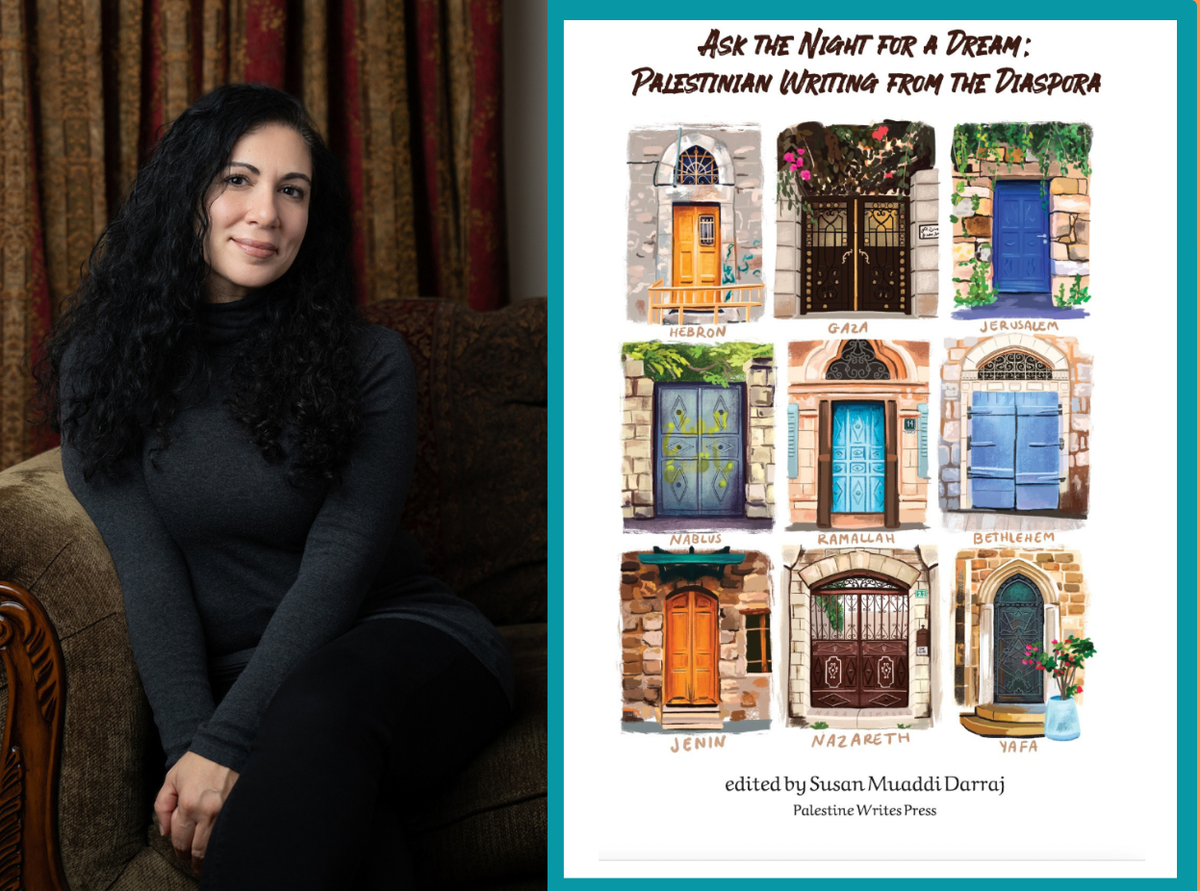
ZAGHROURTA!: Ask the Night for a Dream: Palestinian Writing from the Diaspora, from Palestine Writes Press
An Interview with Susan Muaddi Darraj, editor of Ask the Night for a Dream: Palestinian Writing from the Diaspora (Palestine Writes Press)
1. How did you come to editing this anthology? Who were the guides, teachers, guardian angels, or ancestors who brought you here?
In 2021, I agreed to serve as the Director of Palestine Writes Press. It is a small independent book publisher that seeks to platform Palestinian voices in the diaspora and to highlight our experiences and cultural expression. It was always one of our goals to assemble an anthology of these voices, so I was excited to put the call out for submissions. It was even more exciting to review the many manuscripts that were sent to us for consideration.
I began working in earnest on the anthology shortly after the second annual Palestine Writes Festival, which was held in Philadelphia in 2023. It was an amazing, immersive weekend with some of the luminaries of our literary and artistic community. I think I was filled with the spirit of family, joy, and creativity after that weekend, and I brought that to my curation of the anthology.
2. What do you write/edit/curate towards? What do you write/edit/curate against?
I tried to offer a balance between established and emerging voices in this book: for some of these authors, this is their very first time being published, and that makes me proud. I curated a sense of inclusivity. Palestinians in the diaspora have a range of experiences, based on nationality, class, gender, and many other factors. I also tried to establish a sense of the diversity of genres in which our community writes: fiction, memoir, poetry, TV scripts, drama, and more.
3. How did you find the title of this anthology? What kinds of negotiations were involved—with yourself, the work, the publisher, or the world?
I always liked that line from Darwish, and I thought it speaks to the ways in which Palestinians have to fiercely protect our dreams.
4. We would love to know a little about your process of editing? Did anything about the experience surprise you?
I truly was surprised by the range of genres that were submitted to us. As you see, we have everything from fiction to TV scripts to personal essays to, of course, poetry. I was thrilled to see names that I had never heard before, and to read their work. I was very honored that they trusted us with their precious words, and I hope that the writers feel that we did justice to their vision in this book.
I was surprised by how long it took the book to be completed. This was not anyone’s fault but mine, but then again, we are a press that operates on a purely volunteer effort. However, what actually made it difficult to work was the ongoing genocide. I felt it was impossible to focus on creative writing, on assessing and editing this work, when I, like everyone else, was subjected to daily videos of pure horror coming out of Gaza. Therefore, the book took a lot longer to complete than I had intended, but the contributors were very patient and understanding. In some ways, it felt like we were all grieving together, and thus allowing each other the space to process and mourn.
5. How do you want this work to be read? What do you most wish for from your reader?
It’s funny: when Palestinians meet one another, even for the very first time, it only takes a few minutes for us to establish a warm connection in the interaction. I’m hoping to replicate that immediate connection here. I want readers to feel like they have landed among family and friends when they pick up this book. I want them to open the book to any random contribution and sit with that writer for a while, to see the world through their eyes, to experience their creativity, and to feel that instant bond.
6. Since this series is called Zaghrouta!, we want to know: how are you honoring/celebrating this anthology’s birth? How would you like us to honor/celebrate with you?
It’s hard, of course, to truly celebrate anything in these horrific times, but I want to honor these writers who continue to narrate their own stories, who continue to write and share their work, despite all the efforts to silence Palestinian voices. Every day that we survive, that we continue to write, that we continue to exist should be celebrated. It is remarkable that we endure, and yet, that is the Palestinian way.
***
Susan Muaddi Darraj is an award-winning writer of books for adults and children. She won an American Book Award, two Arab American Book Awards, and a Maryland State Arts Council Independent Artists Award. In 2018, she was named a USA Artists Ford Fellow. Her books include her linked short story collection, A Curious Land, as well as the Farah Rocks children’s book series. She lives in Baltimore, where she teaches creative writing at Harford Community College and the Johns Hopkins University. Her new novel, BEHIND YOU IS THE SEA, was published in January 2024 by HarperVia. It received praise from The New York Times, The San Francisco Chronicle, and Ms Magazine, and it was named a Best Book of 2024 by The New Yorker and Apple Books. Behind You Is the Sea was also longlisted for the 2025 PEN/Faulkner Award.